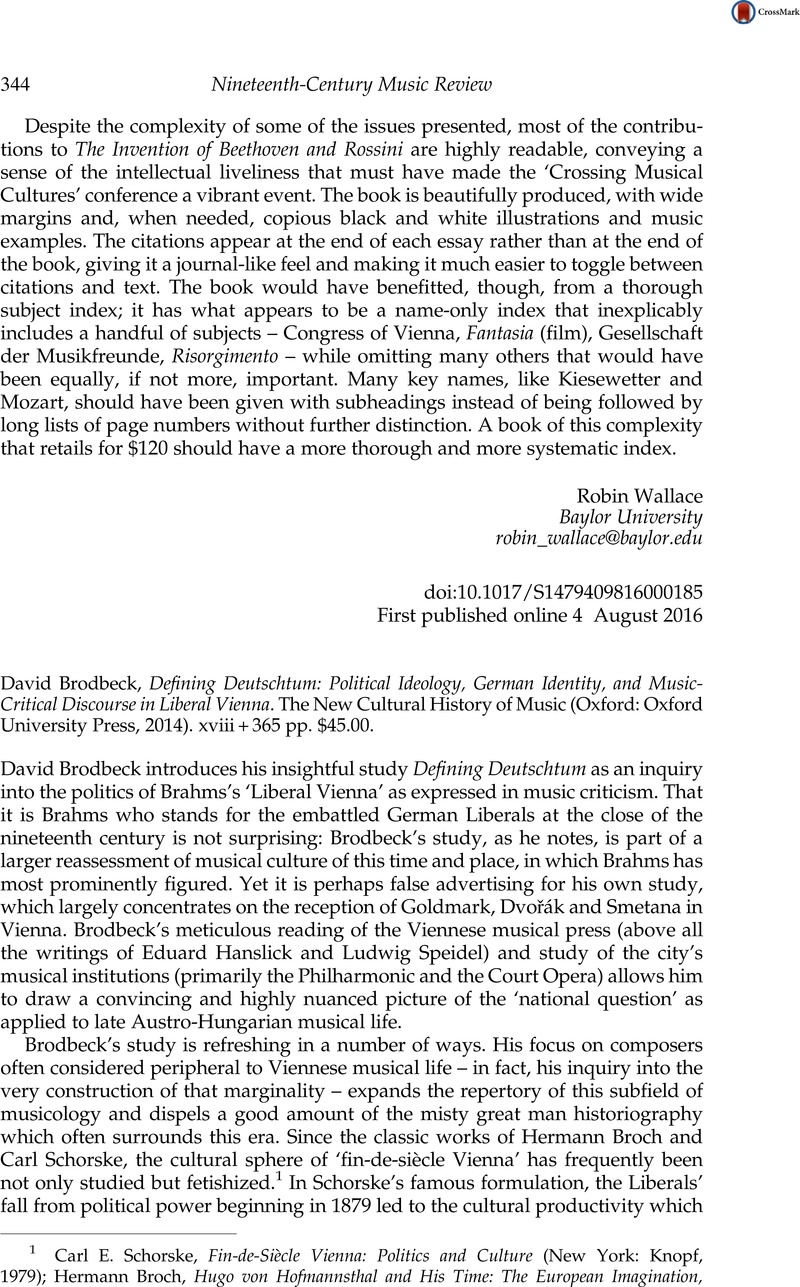No CrossRef data available.
Published online by Cambridge University Press: 07 November 2016

1 Schorske, Carl E., Fin-de-Siècle Vienna: Politics and Culture (New York: Knopf, 1979)Google Scholar; Broch, Hermann, Hugo von Hofmannsthal and His Time: The European Imagination, 1860–1920, ed. and trans. Michael P. Steinberg (Chicago: University of Chicago Press, 1984)Google Scholar.
2 Boyer, John W., Political Radicalism in Late Imperial Vienna: Origins of the Christian Social Movement, 1848–1897 (Chicago: University of Chicago Press, 1981)Google Scholar; Judson, Pieter M., Exclusive Revolutionaries: Liberal Politics, Social Experience, and National Identity in the Austrian Empire, 1848–1914 (Ann Arbor: University of Michigan Press, 1996)Google Scholar.
3 Botstein, Leon, ‘Music and Its Public: Habits of Listening and the Crisis of Musical Modernism in Vienna, 1870–1914’ (PhD diss., Harvard University, 1985)Google Scholar; Notley, Margaret, Lateness and Brahms: Music and Culture in the Twilight of Viennese Liberalism (Oxford: Oxford University Press, 2007)Google Scholar; Karnes, Kevin, Music, Criticism, and the Challenge of History: Shaping Modern Musical Thought in Late Nineteenth-Century Vienna, AMS Studies in Music (Oxford: Oxford University Press, 2008)CrossRefGoogle Scholar; Grimes, Nicole, Siobhán Donovan and Wolfgang Marx, eds, Rethinking Hanslick: Music, Formalism, and Expression (Rochester, NY: University of Rochester Press, 2013)Google Scholar. Brodbeck contributed to the latter collection.
4 McGrath, William J., Dionysian Art and Populist Politics in Austria (New Haven: Yale University Press, 1974)Google Scholar.
5 For a contrasting view, see Efron, John M., Medicine and the German Jews: A History (New Haven: Yale University Press, 2008): 240–242 Google Scholar.
6 Brodbeck, David, ‘Dvořák’s Reception in Liberal Vienna: Language Ordinances, National Property, and the Rhetoric of Deutschtum’, Journal of the American Musicological Society 60/1 (2007): 71–132 CrossRefGoogle Scholar.
7 Korstvedt, Benjamin M., ‘Reading Music Criticism beyond the Fin-de-Siècle Vienna Paradigm’, The Musical Quarterly 94/1–2 (2011): 156–210 CrossRefGoogle Scholar.
8 Botstein, Leon, ‘Music in History: The Perils of Method in Reception History’, The Musical Quarterly 89/1 (2006): 5 Google Scholar.
9 The changing demographics of Vienna during this period are discussed in detail in Maderthaner, Wolfgang and Musner, Lutz, Unruly Masses: The Other Side of Fin-De-Siècle Vienna, trans. David Fernbach and Michael Huffmaster, International Studies in Social History (New York: Berghahn Books, 2008)Google Scholar.